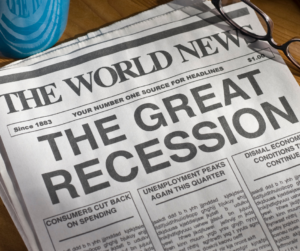I’ve already been asked this a few times this year (it’s January 2): Will the stock market crash in 2024? As we start the new year, we have an opportunity to reflect on the multitude of “mini-crises” that shaped the financial landscape in 2023. These challenges tested our resilience and forced us to confront the uncertainties that accompany economic shifts. However, as we revisit the events of the past year, it’s crucial to put them into perspective, recognizing that headlines often provide a skewed view of reality.

January: Forecast of a 90% Chance of Recession
At the beginning of 2023, major companies bombarded us with ominous predictions, forecasting a staggering 90% chance of an impending recession. Despite the bleak outlook, economic resilience prevailed. Markets experienced fluctuations, but the catastrophic recession that was feared never materialized. This serves as a poignant reminder that predicting the future is an intricate dance of uncertainty and unforeseen variables.
Supporting Article: Why everyone thinks a recession is coming in 2023 (cnbc.com)
What I was saying at the time: Active vs. Passive Investing for the Average Person

March: The SVB Collapse and the “US Banking Crisis”
March brought an unexpected twist with the collapse of SVB, sending shockwaves across the financial sector. The term “US banking crisis” echoed through headlines, sparking fears of a systemic meltdown. However, the aftermath tells a different story. While the event underscored vulnerabilities, the banking sector demonstrated resilience, absorbing the shock with strategic recalibrations.
Supporting Article: The Banking Crisis Has Only Just Begun (forbes.com)
What I was saying at the time: Silicon Valley Bank Closure Explained

May: Debt Ceiling Worries
May ushered in its own set of challenges with worries about the looming debt ceiling. As discussions unfolded, anxiety permeated financial circles, and concerns about potential economic consequences loomed large. Yet, as the dust settled, compromises were reached, and catastrophe was averted. The debt ceiling dance, a recurring saga these days, showcases the intricate negotiations that shape fiscal policies.
Supporting Article: Debt ceiling crisis: How a US default would ricochet around the world | CNN Business
While I was aware of this issue, it is not something that I specifically wrote about. With that said, when asked about it by my clients, my response was centered around long-term solutions and not short-term market movements.
The Mindset Lesson: Focusing on What We Can Control
In the midst of these mini-crises, a powerful lesson emerges — the importance of mindset. We are presented with two options: dwell on what we can’t control, leading to anxiety and worry, or focus on what we can control, empowering us to mitigate potential risks and take proactive steps.
By concentrating our energy on actionable steps within our control, we not only reduce anxiety but also position ourselves to weather uncertainties more effectively. It’s about channeling efforts into prudent financial planning, diversifying investments, and fostering a mindset of adaptability.
The Peace of Mind and Perspective Gained
As a financial planner, my year-end review serves a dual purpose — offering clients peace of mind and providing valuable perspective. It’s a reminder that, despite the turbulence, the world kept turning, and economies remained resilient. The future is unpredictable, and crises will inevitably arise, but navigating them with a focus on what we can control transforms challenges into opportunities for growth.
The Importance of Diversification in Portfolios
One key strategy that emerged from the events of 2023 is the significance of portfolio diversification. Investors who had diversified portfolios, spanning different asset classes and sectors, were better positioned to weather the storm. This serves as a testament to the age-old adage of not putting all your eggs in one basket, a lesson that continues to resonate in the ever-changing landscape of global finance.
Embracing the Future with Resilience
In the grand tapestry of financial markets, each crisis is a thread, contributing to the ever-evolving narrative. As we close the chapter on 2023, let’s approach the future with resilience, knowing that our ability to adapt and focus on what we can control is the true compass guiding us through the uncertainties that lie ahead.
Moving Forward
As we delve into the details of the “mini-crises” that marked 2023, we gain not only insight into the events themselves but also a roadmap for the future. Let’s carry forward the lessons learned, embracing uncertainty with a mindset centered on what we can control. By doing so, we fortify our financial foundations, fostering not just stability but the ability to thrive in the face of evolving economic landscapes.
So will the stock market crash in 2024?
Short answer: No one knows, but we’re focused on the long term and we’re controlling what we can control.
This post is for educational and entertainment purposes only. Nothing should be construed as investment, tax, or legal advice.

